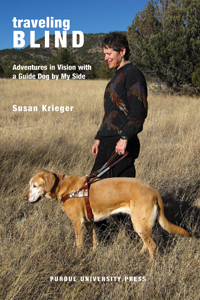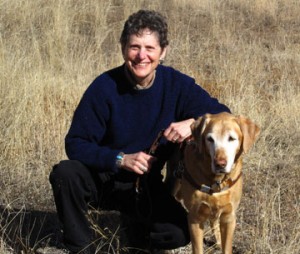; Susan Krieger faces daily what we all fear.
Susan Krieger faces daily what we all fear.
She’s blind. Or rather, like most blind people, she is not completely sightless, but her vision is “impaired or unreliable.” Traveling Blind (Purdue University Press) is Krieger’s discovery, with companions, of a new world and a new kind of vision as she journeys through cities, airports, and the deserts of the Southwest.
Krieger will be giving an “author talk” at 5:30 p.m. Tuesday, May 11, at the Stanford Bookstore. She will also be on KQED-FM Forum Radio on Friday May 14, and on Technation Radio on Sunday, May 9, to discuss the new book.
“I wrote it over a period of several years during which I revisited the desert places I loved, hoping they would not change as quickly as my eyesight,” she wrote. She did not travel alone: the companions include her “golden dog” Teela, and her pseudonymous companion, “Hannah,” known to many of us as Estelle Freedman.
Krieger suffers from “birdshot retinochoroidopathy,” which she describes as a “rare autoimmune disease that causes inflammation on my retina and choroid and affects both my central and my periperal vision. … Although the severity of the condition — the amount of swelling and scarring — varies over time, the condition is chronic and progressive without a cure.”

Author and Teela
According to author Mary Felstiner, “As the author takes to the road, we come to understand that to ‘see’ is some combination of perception, memory, and desire. As Krieger explores the commitments between humans and animals, she shows traveling as a challenge for both, but worth it all the time. Traveling Blind is an unforgettable experience, and at the same time a great read.”
Krieger, who teaches in feminist studies at Stanford, is the author of a previous book on blindness, No Longer There: A Memoir of Losing Sight and Finding Vision, and several other books.
A sense of wonder pervades her observations, as she pursues patches of light, the fading glow of a sunset, and random pinpricks of light. Some passages hint at our existential condition:
“For me, there are many kinds of light, and I need to remember and value each one, all the more so as I become surrounded by increasing darkness. The Christmas lights piercing the night sky reminded me of all the other lights. They reminded me that no matter what my initial sense of disappointment or loss, my experiences could be converted into highpoints, brightness, and unexpected satisfaction. I hope forever to keep an image of the night Hannah, Teela, and I drove around chasing Christmas lights, Hannah speeding off in search of a distant glow; me straining to see, yet delighting in my sight.”
